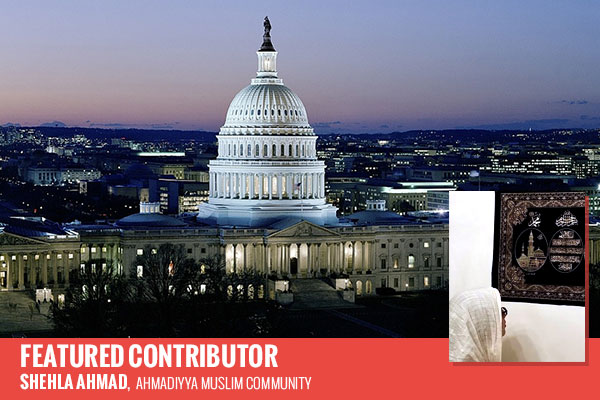
There is a prevailing false perception amongst the Muslims surveyed that Sharia needs to be imposed upon all citizens regardless of their faith in the form of an Islamic government.
Pew Research Center conducted a survey in 2015 wherein they asked ten highly populated Muslim countries about the extent to which the Quran should influence their national laws. As per the survey results, Muslims in some countries responded that laws in their countries should strictly follow the teachings of the Quran, while others expressed the opinion that laws should only be generally guided by Islamic values and principles. Surveys like these demonstrate that some Muslims have been led to believe that Islam should be incorporated in their governing practices, despite the fact that the Quran is quite clear that governing requires a separation of mosque and state.
True Islam Wants Separation of Mosque and State, Not Sharia Law for All[/tweetthis]
Religious laws known as Sharia are a code of life matters intended for Muslims only. Based on this survey, there is a prevailing false perception amongst the Muslims surveyed that Sharia needs to be imposed upon all citizens regardless of their faith in the form of an Islamic government. This ideology is false and in ignorance of the true teachings of the Quran. And sadly a belief that extremists tend to capitalize upon, creating a divide between Muslims and non-Muslims.
Such confusion and misinterpretation regarding Sharia have led to some false notions suggesting that Islam rejects democracy and advocates a so-called “Islamic government.” However, nothing could be farther from truth. The Quran provides general guidance on the subject of governance. It recommends that justice, not religion, should dictate any government. Verse 42:39 of the Quran suggests that “affairs are decided by mutual consultation,” thereby further substantiating that Islam embraces democracy.
The Quran further indicates that law-making is done through public consensus similar to our modern day democracy. The Quran enlightens Muslims by advising them that the election of their representatives is a trust, which should be carefully discharged so that those elected adhere to the principles of justice for all. Further commentary on the matter indicates that “Verily, Allah commands you to make over the trusts to those entitled to them, and that, when you judge between men, you judge with justice” [4:59]. Additionally the Quran states, “O ye who believe! Obey Allah, and obey His Messenger and those who are in authority among you” [4:60] clarifying that Muslims must be law abiding citizens regardless of the faith of the ruler. The Quran does not allow Muslims to overturn any government’s Constitution and replace it with Sharia law. The Quran indicates that any government based on justice will guarantee religious freedom for all. A crucial point, which is the heart of separation of mosque and state per the Quran, is that law-making is the job of the legislature and not that of religious clergy. Since most moral codes around the world have had some religious basis, should people desire laws based on morality inspired by their faith, a national vote must be enacted upon but never forced upon any citizen.
Currently, the TrueIslam.com education campaign further clarifies this subject. Points 4 and 5 of the 11 point campaign indicate that religion cannot be forcibly imposed when the Quran categorically declares that “there should be no compulsion in religion” (2:257). Clear guidance to the Prophet Muhammad (pbuh) in the Quran states, “Admonish, therefore, for thou art but an admonisher” (88:22) and thus Prophet Muhammad (pbuh) never forced Islamic laws over non-Muslims. Such clear directives, only beg the question today asking how any Muslim cleric could consider enforcing Islam politically when the Prophet of Islam was forbidden to do so?
True Islam strongly advocates that laws of a country should respect fundamental rights of all citizens including minorities and be based on the principles of justice. True Islam categorically rejects the notion that Muslims have any inherent privilege or superior entitlement to justify enforcement of their faith in the whole world. Principles prescribed by True Islam are in line with a secular government which guarantees rights of all of its citizens by ensuring justice for all. The ideology of politicizing Islam has been instilled in the masses solely for political gains. Muslims should acknowledge that sectarian ideological differences alone make it impossible to ever narrow down an agreement in defining a universal Sharia law, further adding to its difficulty to impose. Furthermore legally enforcing the faith of the majority upon minority citizens will only result in nourishing hatred towards religion, perpetuate divisions, and most significantly violate justice as the core measure of peace for any society.
Religion is between God and man, and no government can regulate this relationship. Enforcing Sharia does not complete one’s faith, but the protection of rights of minorities does, as the latter was explicitly emphasized through words and actions throughout Prophet Muhammad’s (pbuh) life. It would be interesting to ask those Muslims who advocate imposing Sharia on all whether they would also welcome imposition of faith-based laws on Muslims living in non-Muslim majority countries based on the religion of majority?
